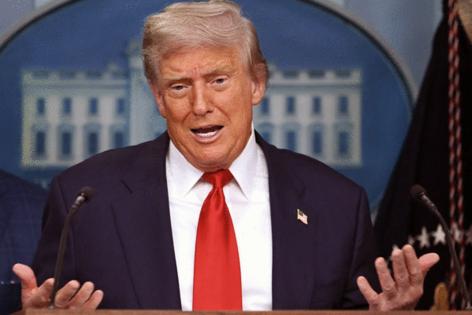Court limits funding lawsuits to GAO
Published in News & Features
WASHINGTON — A federal appeals court said Wednesday that only the Government Accountability Office can sue over the Trump administration’s funding freezes — not people impacted by the funding cuts.
The 2-1 decision from the U.S. Court of Appeals for the District of Columbia Circuit undid a lower court ruling requiring the Trump administration to start spending funds for the U.S. Agency for International Development and other foreign assistance funds.
Judge Karen LeCraft Henderson, writing for the majority, said that the 1974 Impoundment Control Act means that only the GAO can sue when the president withholds funds passed by Congress.
The decision could reverberate across numerous other cases where states and groups have sued, arguing that President Donald Trump illegally withheld funds under the law. With Wednesday’s decision, the majority held that when a president withholds federal funds under impoundment, it involves the Impoundment Control Act, not normal administrative law.
“Instead, the Comptroller General may bring suit as authorized” by the Impoundment Control Act, the majority wrote. “Accordingly, we vacate the part of the district court’s preliminary injunction involving impoundment.”
The 1974 law at the center of the case, the Impoundment Control Act, was passed after several court fights over Nixon administration decisions to withhold appropriated funds. The law lays out a series of steps for a president to withhold funds and an expedited process for Congress to vote on rescinding appropriated funds.
That includes a process by which the president notifies Congress of an intent to withhold funds and Congress’ ability, through the GAO, to sue if funds are withheld contrary to the law.
Henderson wrote that “it does not make sense that the Congress would craft a complex scheme of interbranch dialogue but sub silentio also provide a backdoor for citizen suits at any time and without notice to the Congress of the alleged violation.”
Litigants in the case vowed to keep fighting Wednesday. In a statement, Lauren Batemen of the Public Citizen Litigation Group criticized the decision as a “significant setback for the rule of law and risks further erosion of basic separation of powers principles,” and said they would seek an appeal.
“In the meantime, countless people will suffer disease, starvation, and death from the Administration’s unconscionable decision to withhold life-saving aid from the world’s most vulnerable people,” Batemen’s statement said.
The decision would next go to the full D.C. Circuit before potentially going to the Supreme Court.
Judge Florence Pan dissented from the majority, which she criticized for ignoring “constitutional alarm bells” from Trump’s actions.
“Moreover, the Supreme Court and our court have stated in no uncertain terms that the Executive, as a constitutional matter, has no authority to disobey duly enacted statutes for policy reasons,” Pan wrote. “Yet that is what the majority enables today.”
Court fights over Trump’s effort to cut foreign aid funds and wind down USAID dominated the first few weeks of his administration, and have already included one trip to the Supreme Court.
In campaigning for office, Trump and his allies argued the law is unconstitutional for placing limits on the president’s ability to decide how funds are spent. The administration has already used the law once to rescind about $9 billion in appropriations across government programs, including foreign aid.
Several times so far in the second Trump administration, the GAO has held that Trump decisions to withhold funds violated the impoundment law. That includes last week, when the GAO found that canceling billions of dollars in research grants at the National Institutes of Health violated the law.
Republicans in Congress have also targeted the GAO, including by advancing a legislative funding bill that would cut about $500 million of the office’s funding and bar it from bringing lawsuits under the Impoundment Control Act.
The case is Global Health Council et al. v. Donald J. Trump in his official capacity as President of the United States of America, et al.
©2025 CQ-Roll Call, Inc., All Rights Reserved. Visit cqrollcall.com. Distributed by Tribune Content Agency, LLC.







Comments